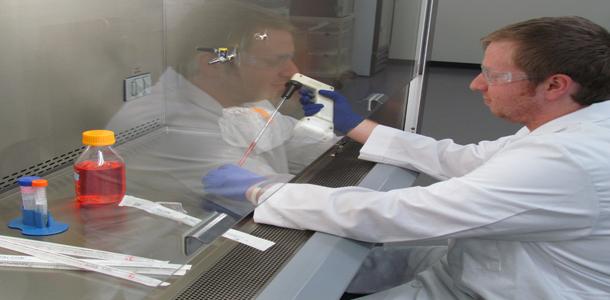In the Biotechnology Department, excitement is buzzing around the new stem cell lab, enabling the college to further develop in Stem Cell Education. This highlights the Stem Cell Certificate program, an eight- credit two-semester course.
Madison College is one of the only two-year colleges in the country that utilizes human stem cells (embryonic and human induced pluripotent cells) as part of the educational program. There are a few other community colleges around the United States that are also working with stem cells, but they are derived from mice.
Tom Tubon, project director for the Emerging Stem Cell Technologies Initiative here at Madison College, is very excited about the new opportunities this will bring.
“Our program is designed to evolve with our local industries; what we teach today may be dramatically different than five years from now, but we will have a program which is current with our emerging industries with built-in flexibility to adapt to the new technologies,” Tuban said.
In 1998, a University of Wisconsin-Madison cell biologist named James A. Thomson first derived human embryonic stem cells.
“We are pretty proud that one of our co-instructors, Dr. Srikumar Sengupta, is a scientist currently in Thomson’s lab,” Tuban said.
The Stem Cell program at Madison College started out with more humble beginnings. The College first started offering a basic stem cell course in 2009, utilizing stem cells garnered from WiCell, one of six local stem cell based companies. However, in mid-2011, Madison College was awarded over $850,000 from the National Science Foundation to help fund the burgeoning Stem Cell Education program.
Madison College came up with $165,000 to do the remodeling, coupled with about $60,000 from the grant. The remaining large value of the National Science Foundation grant is aimed at helping Madison College offer these technologies to other colleges nationwide, helping them establish programs at their institutions and thus becoming a model for other colleges.
The future lab space started to be redesigned in July 2011. The remodeling process took about six months, but the new facilities are indeed an upgrade worth recognizing. The original lab space was a mere 150 square feet, and the expanded renovations have increased this to about 2744.
January marks the first semester that the new stem cell lab is open for business. The second half of the program, Stem Cell Methods II, was created and has a maximum enrollment of 12 students.
Tubon is especially grateful for the opportunities afforded to Madison College.
“Prior to our grant, we were really limited with resources. Since we began, we had 23 students complete the first semester. This semester is the one where we have the first group of 11 students registered for the second semester of the certificate,” he said.
Tubon is anticipatory of the successes of the program.
“Our biotechnology program provides students with real-world experiences to help them in the biotech workforce; we design all of our things around what the industry calls for,” he said.
Because of the complexities of moral and ethical issues surrounding the use of human stem cells, Tubon stressed that it is important to note that the stem cells utilized here at Madison College are provided by outside companies such as WiCell. Students in the Stem Cell Methods program are taught to use these cells for learning purposes and practical training, which is the main focus of occupational programs. The in-depth research on the cells is done externally at other sites.


























